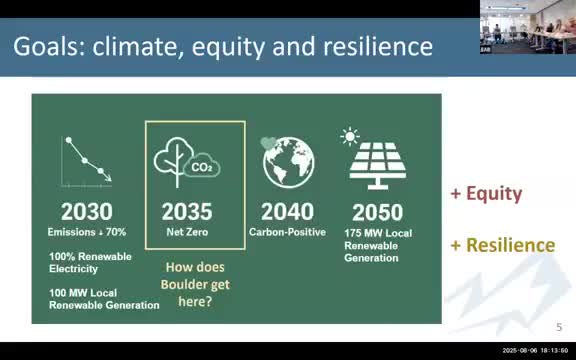Boulder develops ten-year roadmap for achieving carbon neutrality by 2035
August 08, 2025 | Boulder, Boulder County, Colorado
Thanks to Scribe from Workplace AI , all articles about Colorado are free for you to enjoy throughout 2025!

This article was created by AI using a video recording of the meeting. It summarizes the key points discussed, but for full details and context, please refer to the video of the full meeting. Link to Full Meeting
The roadmap emphasizes a shift in focus from merely reducing emissions to enhancing the overall health and resilience of the community in the face of climate change. With increasing instances of extreme weather and poor air quality, the need for energy-efficient buildings has never been more critical. The board highlighted that many existing structures are not equipped to handle rising temperatures, which could lead to higher energy costs and health risks for residents.
Key components of the roadmap include policy and program recommendations, a funding strategy, and a community engagement plan. The board has collaborated with a consultant to analyze the current state of Boulder’s building stock, assessing heating and cooling systems and identifying potential pathways for decarbonization. This analysis will inform the development of financial incentives and support mechanisms for residents and businesses looking to upgrade their buildings.
The roadmap is designed with a ten-year timeline, aligning with Boulder’s climate action plan. It aims to not only reduce emissions but also stabilize energy costs and promote equity within the community. The board is actively seeking feedback from stakeholders, including residents and building professionals, to refine the proposed strategies before presenting them to the city council.
As Boulder moves forward with this initiative, the focus will remain on fostering a resilient community that can adapt to the challenges posed by climate change while working towards a sustainable future. The next steps will involve synthesizing community input and finalizing the roadmap for implementation.
Converted from 8-6-25 Environmental Advisory Board Meeting meeting on August 08, 2025
Link to Full Meeting
Comments
View full meeting
This article is based on a recent meeting—watch the full video and explore the complete transcript for deeper insights into the discussion.
View full meeting
